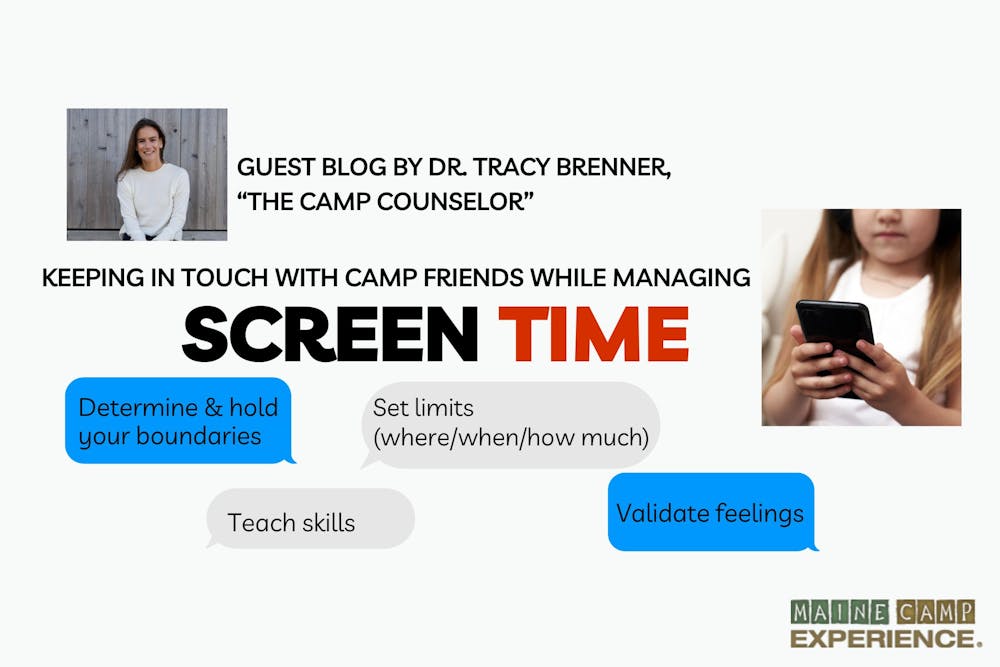
Keeping in Touch with Camp Friends While Managing Screen Time
October 13, 2024
Guest blog by Dr. Tracy Brenner, “The Camp Counselor” and Maine Camp alumna, for Maine Camp Experience
A screen-free summer is, and always has been, one of the many rewards of sleepaway camp. But thanks to the research of Jonathan Haidt in his bestselling book, The Anxious Generation, parents today have an even greater understanding of the detrimental impact of devices, particularly smartphones and social media, on mental health. As a result, many parents (myself included) are considering delaying smartphones and social media for their children. While camp offers a screen-free bubble, what happens when your camper returns home and wants to connect with camp friends? Parents frequently ask, “should I allow my child to be on group chats with camp friends?” Alas, this is a parenting choice, but here are some tips to help you navigate it:
If you’re a hard “no” on group texting: There is no need to change your parenting choices and values amidst the strong pressure from your child to be able to text camp friends. As with any parenting decision, your child’s feelings about limits should not be what determines rules. If you are committed to delaying group text access for your child, empathize with their desire to connect, listen to and validate their concerns, hold your boundary, and explore other ways to stay in touch that actually allow for deeper connection. For example, say something like this: “I am so happy to hear how you’ve made such great friends at camp and want to stay in touch. At this age, we don’t allow access to group chats. I’m sure you are disappointed and maybe even worried about missing out on things happening on chats. I get it: Feeling left out is an icky feeling. Instead of texting, let’s think of other ways you can connect. I’m always happy to reach out to a parent of a camp friend to set up a FaceTime or to see if we can get together. I know it’s not the same as group chats, but these methods actually allow for more meaningful connection with friends.”
If you’re okay with texting, set limits and teach skills: Step 1: Set limits and boundaries with empathy and validation: “I hear that you want to connect with your camp friends via text in the offseason and I’ll support that. But we also know that screen time is not good for kids, so we are going to set some limits on when, where and how long you can have access to text.”
Examples of limits:
“Where” Limits: Think about where they can text. An iPad or computer in a public space at home is preferable to a phone in their bedroom. This allows a parent to provide support if their child is having difficulty communicating or something comes up that makes them uncomfortable.
“When” Limits: Think about the time of day and how frequently you allow access to texting (for example: 15 minutes a day, 2x per week).
Your child will likely resist your boundaries and that’s okay. They are allowed to be upset and disappointed and you are allowed to have rules. Provide empathy for their disappointment when their time is up as well as for their anxiety that they may be missing conversations when they aren’t online. Use this as an opportunity to teach your child to sit with those feelings of discomfort. Learning to tolerate these moments of frustration that they are not always connected, not responding to a text immediately, or that they just won’t be involved in every conversation will ultimately help teach them to be less tethered to their device, build frustration tolerance and the ability to delay gratification.
Teaching skills:
Children don’t innately know how to text. However, we often just hand our children a device without any direction. If you are going to allow texting, teach texting etiquette. Let them know that you will be monitoring the chat to help your child learn this new skill and make sure they are safe. Teach your child how to engage, be responsive, and say goodbye before they log off. Texting will ultimately become a primary mode of communication, so teach them how to do it effectively.
Remind your child of the permanence of text and that they should not say anything over text that they wouldn’t say in person.
Make sure your child knows to come to you if anything is sent that upsets them or confuses them in the chat.
Finally, make sure that the desire to connect is coming from your child and not your concerns about them being left out. I say this all the time: It’s okay if your child wants to let camp happen at camp. Some kids love camp and their camp friends but are fully engaged with their home friends, school and sports during the year. Camp relationships are different, powerful, and special because of the uniqueness of the camp environment. Friendships will continue to flourish at camp, even if they are not calling, texting or visiting during the school year.
Maine Camp Experience Resources & Tools
Looking for the perfect Maine camp for your child? Try out our helpful tool where you can select a camp by choosing: type of camp (girls, boys or coed) and session length (1-8 weeks). It helps to narrow down a few camps to a manageable list that includes rates. Then you can research these camps in more depth. Next, be sure to contact our Maine Camp Guide, Laurie to discuss these camps as well as for free, year-round advice and assistance on choosing a great Maine summer camp for your child.